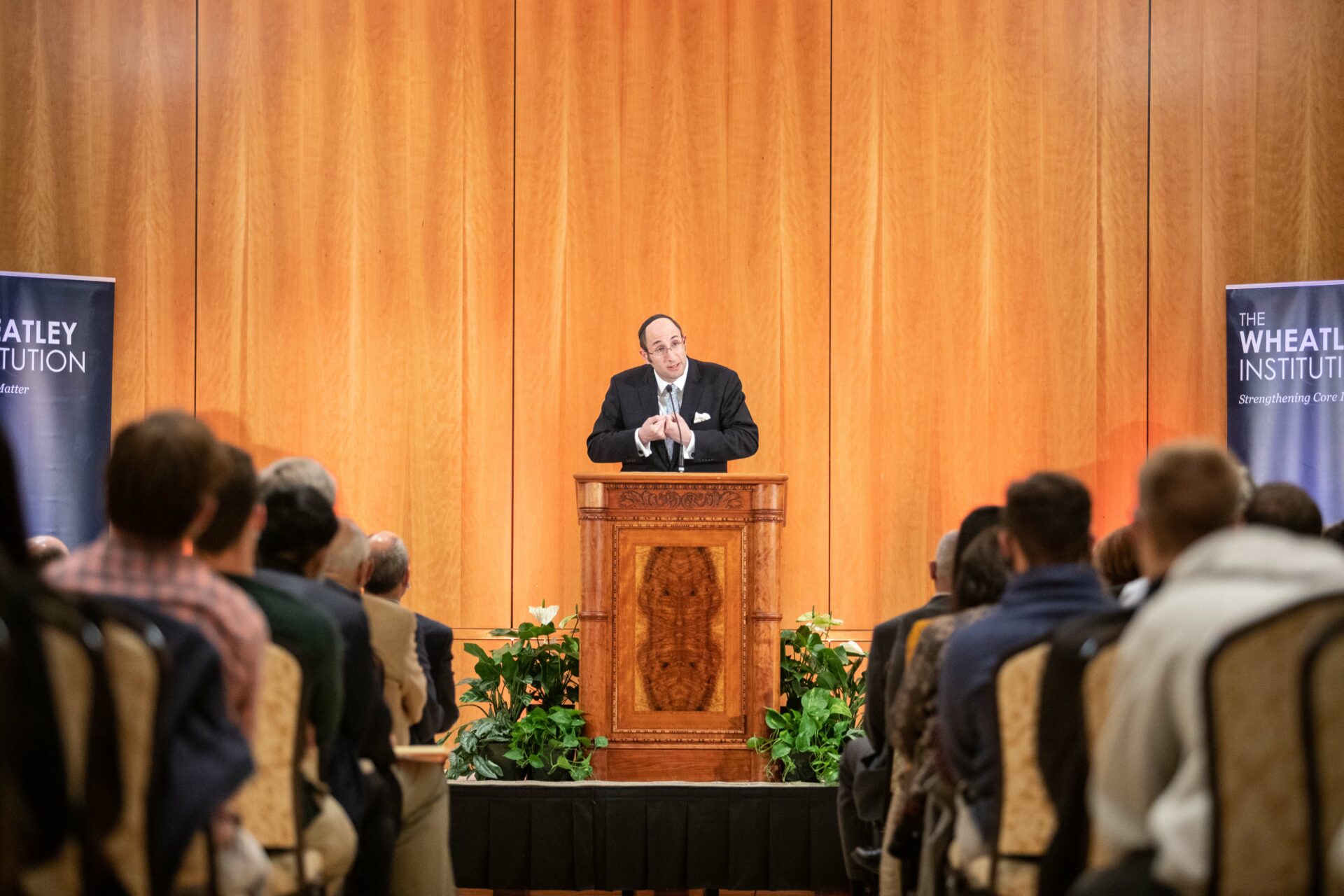
Rabbi Meir Soloveichik discussed Jerusalem’s significance and the “miracle” of the Jewish people during the Wheatley Institution’s Truman G. Madsen Lecture on Eternal Man.
His lecture on Oct 21., “The Eternal Jerusalem and the Future of Faith,” focused on the theological significance of Jerusalem and included connections between Latter-day Saints and the United States to the Jewish community. Elder Quentin L. Cook of the Quorum of the Twelve Apostles was among those in the audience.
Soloveichik is a professor of Judaic studies at Yeshiva University and rabbi of Congregation Shearith Israel. Congregation Shearith Israel is the first Jewish congregation established in North America in 1654, making it one of the oldest Jewish congregations in the United States.
Soloveichik began his speech by including details of a Jerusalem visit in 1871 by William Seward, former U.S. Secretary of State and trusted friend of Abraham Lincoln. Seward’s account included the journey of a sick mother on a pilgrimage to Jerusalem in 1871 who passed away from her illness as soon as she arrived, which Soloveichik related to his own grandparents who were also buried in Jerusalem.
“In Jerusalem, we discover a profound particularism, but also a glorious universalism, and indeed they too go hand in hand.” Soloveichik said.
He addressed the issue of tribalism and explained that Jerusalem is an embodiment of the “brotherhood of Israel” and would “forever become the locus of Jewish belonging.” This “law of Jerusalem” is what Soloveichik said was the reason to unite the Jewish people even when dispersed around the world.
While also addressing the “scandal” of Jewish particularity, Soloveichik shared the perspectives of non-Jewish writers and noted the absence of the Hittites, a once flourishing civilization, in comparison to the once “weak and obscure” Jews still being a relevant group in modern society. He quoted novelist Walker Percy, “Where are the Hittites?”
He continued, saying how “presence of infinitude” and Jerusalem’s place on earth was “linked to the miraculous chosenness of the Jewish people.” Soloveichik added that Solomon’s vision of a time when all people will be inspired and serve God and Jews did not necessarily mean that all people would become Jews themselves, but they would come to know the Jewish God.

“How does one connect the world to Jerusalem?” Soloveichik asked.
His answer focused on David’s kingdom of Israel in the Bible and claimed that the importance of Jerusalem fulfilled the two visions of David and Solomon. Jerusalem is “a city that is profoundly Jewish, but which, through the miracle that is Jewish history, inspires humanity.”
Soloveichik stated, “If there were those who embrace both the particularism and universalism of Jerusalem, they were to be found, first and foremost, in America.”
Using his late friend Rabbi Jonathan Sacks’ visit to and fascination with America, Soloveichik spoke of biblical Israel’s impact on the foundation of the U.S. He said that it is “no accident” that the founders of the country turned to the Hebrew Bible and that Israel and the U.S. were two “supreme examples” of societies in conscious pursuit of an idea.
Soloveichik connected Latter-day Saint apostle Orson Hyde’s prayers with the modern-day fulfilment of prophecies regarding the Holy Land. He characterized Jerusalem as a “City of Hope” as it can be seen as a beacon of hope in dark and difficult times.
In the conclusion of his speech, Soloveichik advised fellow Jews to respond with gratitude. He cited the reverence in the publication of the US Army Talmud being a major and “beautiful” expression of gratitude. Soloveichik then acknowledged the deep bond between America and the “Jewish miracle.”
“May we continue to find a bond together in marveling at all that Jerusalem is, and all that it is meant to be,” he said.




